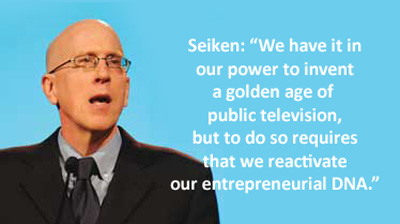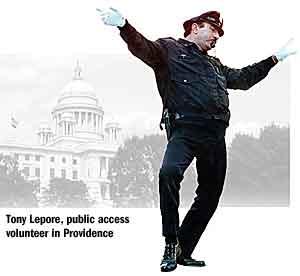Tag: Television programs
If ratings don’t correlate to dollars at pledge time, what will?
PBS began mining national Nielsen data for pledge-drive audience insights in 2009, but it hasn't learned what to do about declining pledge ...Pledge Pipeline 2012-13
Current’s Pledge Pipeline previews 17 shows heading to public TV on-air membership drives in December 2012 and March 2013.PBS chief endorses ouster of Market Warriors host Fred Willard
LOS ANGELES — It’s unlikely that PBS will reinstate Fred Willard as announcer of Market Warriors, its new antiquing reality show, if Los Angeles ...Output: Bitton’s homage to Piaf, STEM rock tunes from PBS, where 5-year-olds hide evidence (on PRX), ...
Decades ago, a teenaged Raquel Bitton locked herself in her San Francisco bedroom, suffering miserably from her first broken heart. Her only comfort ...Independent KCET savors big ambitions, makes slow progress
Halfway through its three-year transition from one of PBS’ leading outlets to an independent public TV station in the world capital of ...Dismissals at Alabama PTV linked to concerns over proposed broadcast of videos from religious right
See also more complete story from print edition of June 25, 2012. Two top managers at Alabama Public Television were fired from ...PubTV tests new approaches for fundraising with kids’ programs
Though public television stations have been reluctant to solicit pledges during their daytime PBS Kids block, some are testing new approaches for ...Kerger suggests viewers contact NEA “if they have issues with the focus of their funding”
In an article in the Deseret News, PBS President Paula Kerger advises viewers to reach out to the National Endowment for the Arts to ...“Live from Lincoln Center” creator retiring after more than 30 years
John Goberman, who created Live From Lincoln Center more than three decades ago, is departing as executive producer on June 30 after more than ...Extolling public TV’s mission with an edge
I love standing on a stage — especially in the American heartland — and saying to 500 public television supporters, “Fear is ...Needed: courage to shape digital video future
"Today I want to lay out a vision for how we can invent our future, a future where public television is serving ...Alliance with pubTV boosts Rhode Island PEG
Rhode Island is a proven example of what can happen when public TV and public access media collaborate, but their merger is ...Output: Prop 8 goes down in starry radio docudrama, online cultural essays graduate to videos at ...
On Sunday, June 10, L.A. Theatre Works debuts a radio docudrama about the federal court case that overturned the referendum that banned same-sex marriage in ...Treaty puts indie films in Monday slot
Independent Lens and POV, the PBS series at the center of a dispute about public TV’s commitment to independent film, are moving to Monday nights, ...UConn’s ratings-rich lady hoopsters desert CPTV
The 18-year partnership that helped prove there’s an audience for collegiate women’s basketball came to an end last week when the University ...











